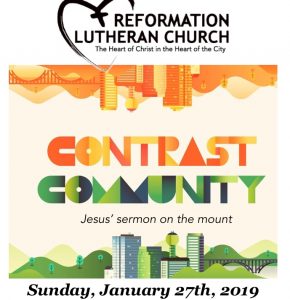Texts: Matthew 5:1-12
Subject: The Beatitudes
Third Sunday after Epiphany; January 27, 2019, Reformation Lutheran Church, Las Vegas, NV
Pastor Jason Adams
Grace and peace to you from our Father in heaven and the Lord Jesus who is the Christ. Amen.
It’s okay not to be like everyone else. I remember I learned that pretty early on in life. I was the little kid, the kid who got good grades, the weird hair kid, the funny kid. I knew I was different. I was always smaller than most of my peers. I did well in my classes. In high school, my hair was most often compared to Sideshow Bob from the Simpsons, with the ringlet curls, which hung below my ears (I’ll show you a picture later if you want). I made jokes to stay alive, and make friends instead of enemies. I was afraid of the future at times. I had no idea where I was going or how I would end. (Maybe none of us do?) I would have rather been part of the crowd, a better athlete, stronger, taller, sure. But I knew I had to accept the way things were and just try to get along. At some point I had to learn that I was blessed to be different. Maybe you are too.
The people Jesus taught were different. The ones he calls are different. At their best, they live in a way that is different from the world around them and they see things a little differently.
Jesus went from being tested by Satan in the wilderness to calling some disciples – ones who would follow him and learn from him. They left behind a comfortable living, their families, and the hard but stable work on their fishing boats. What could they have expected? What would they come to know about themselves and Jesus? He didn’t promise them much, but told them they would “fish for people.” Their future was likely predictable – James and John only had to look at their father Zebedee, right there in the boat to see their reward.
To really hear Jesus’ most famous sermon here in the beginning of his ministry in Matthew’s Gospel, we have to understand a little about these people he spoke to – they were likely poor, relatively powerless, still grieving the loss of the temple, the pain of those years spent in exile, the loved ones lost to wars and oppression, and had very little hope of the future. There was a stark contrast between them and the growing, thriving, powerful and oppressive empire that ruled over them. Maybe they were not thinking about the future, but just trying to survive.
Luke’s gospel has Jesus’ first public teaching taking place in the synagogue, where he reads from the scroll of Isaiah, but in Matthew’s good news, Jesus has been going around teaching, preaching, healing, and getting well known. Something about this guy is different. He takes the position of a teacher and as the crowds come to hear him, Jesus begins this most famous sermon in the Bible.
Blessed? Who?
This word blessed is understood in many ways. Maybe you’ve heard it translated as ‘happy.’ Happiness doesn’t seem to quite fit the ones Jesus is talking about here, but perhaps a future exists where they might be happy as we think of the word. They might have understood it differently within this proclamation of promises – and there are nine promises here for those who find their lives in contrast with any understanding of blessedness or happiness. I read it more as content, satisfied, or maybe we can read it today as “held.” To be blessed is not to have some material wealth, to be lucky, or fortunate, but to be held in God’s love.
Blessed are the poor in spirit.
While different from Luke’s version of “blessed are the poor,” to be poor in Spirit is to lack so much that one must rely fully and totally on the help of God. To know that we are ones unable to live as we were once created to be, is to know how fully we must rely on God’s mercy and grace. In our culture where most of us have most of what we need, this can be hard for us to understand, but to know deep poverty is to be unsure of your own value as a person – to lack not only food but dignity and hope for the future. Jesus follows this first beatitude with the promise – for “theirs is the Kingdom of heaven.” It’s all theirs. The Kingdom of heaven is all for those who do not even know their blessedness, – they are held and promised a new future in God’s reordering of reality.
Blessed are those who mourn.
Whether we mourn for the loss of a spouse, a parent, our health, a job, a ministry, or a relationship, humans know what it means to lose. We mourn that the world we live in is not the one we had hoped to build. In the depth of the pain of grief, we can know with our minds that healing will come, and yet, the pain is all too real. Jesus’ promise that they will be comforted is a hopeful glimpse into a future where the fullness of God will be really real – it’s already here in the Lord, and not yet in the fullness of time. In the future, there will be no doubt. But we still feel the pain of death, and we may mourn the effects of our failings, and live in a world that gives little comfort. The future promise remains.
Blessed are the meek.
Gentle strength was not a quality that was lifted up often in the lunch room in tenth grade. Submission or being timid is most often seen as weakness. I tended to bring food from home and eat my lunch in the drama room. Meekness and humility are qualities that Jesus values and embodies in his life and ministry – his people are lost sheep, his ride into Jerusalem is humble. Psalm 37 rings in this teaching from rabbi Jesus, “the meek shall inherit the land” (Ps. 37:11).
Blessed are those who hunger and thirst for righteousness.
Were Jesus first disciples hungry for something? Did they know this fishing life wasn’t the thing that they were made for? The fourth beatitude finishes a series on things that Jesus’ followers lack or long for. To hunger for righteousness would be easy, since it’s hard to find. Think Johnny Lee’s “Looking for Love in all the Wrong Places” or “I Still haven’t found what I’m looking for” by U2 and you get the idea. It’s about love – right relationships – justice brought about through God alone. To lack right relationship with God and one another leads to an unjust reality – and a hunger only God can fill.
Blessed are the merciful.
Wartburg Seminary professor Jim Bailey writes that “In Matthew, mercy represents the essence of love.” Since it is God who is merciful, it is God alone who brings about righteousness through the death and resurrection of Jesus, and those who truly receive mercy will be ones who are merciful in the world.
Blessed are the pure in heart.
The heart in the ancient world was not about emotions, so to be pure in heart would be more like sincerity, intentionality, or even mindfulness especially in worship and reverence to God. To have a pure heart is to intentionally follow Jesus in the world without selfish motive or seeking reward. Easier said than done, I think. But Christ promises they will find closeness to the Lord in the lasting Kingdom.
Blessed are the peacemakers.
Nonviolent resistance was surely a contrast to the world in which those who heard Jesus’ preaching found themselves. Violence was the way. War was a big deal, and it was all around them. To be a peacemaker among this group of powerless farmers, shepherds, cast offs and commoners was to set things right between people. Jesus names those who reconcile relationships in the community as ones who follow in their master’s footsteps. They are children of the promise.
Blessed are those who are persecuted.
The ones who followed Martin Luther King, Jr., who sat in silence at lunch counters, were sprayed with hoses, and pelted with rocks and sticks, who were arrested, beaten, and jailed did so because they believed so strongly in the cause of justice and equality that they were willing to endure these attacks. The baptismal call to work for justice in the world can bring about violent outcomes. Bailey writes that “the commonwealth of God does not come without struggle and resistance from those invested in the status quo.”
Blessed are you when people revile you and persecute you and utter all kinds of evil against you falsely on my account.
The ones who followed him would know that Jesus was leading into dangerous territory. They were bound together, and would risk receiving the punishments he would receive. His disciples are assured that any threats, pain, or suffering they would encounter in following him was worth it.
They were different, after all.
If the first four chapters of Matthew’s gospel being to revel who Jesus is, this fifth chapter begins to show us who those who follow Jesus will become. We may not be there now. We can’t make ourselves poorer, meeker, purer. But a life in following Christ will reveal the one who is working in us. Mary Hinkle Shore (newly named dean of the Lutheran Theological Southern Seminary at Lenoir-Rhyne University in South Carolina) writes that,
“followers of Jesus embody something like an ‘alternative universe’ right in the middle of one that is characterized by the reign of the mean-spirited, the proliferation of fake news, and the dehumanization and exploitation of the disenfranchised.”
We are not a status quo community. We are a contrast community. We are ones who are different. If we are following Jesus into this already-and-not yet Kingdom, we can know that we have a purpose, to let ALL people know how blessed they are, how held they are, how loved they are, not because they or we got a new car, a comfy mattress, or won a jackpot, or because they or we say great prayers, or seem ultra-connected to the divine, or speak with Godly wisdom, but because they and we are ones who have suffered for Jesus’ sake. We are all ones who are in need of Jesus, and no matter what happens to us, we can be assured that we will still be held in the grace God. The promise is true. We know this when we trust the one making the promise. If the one who promises is trustworthy, can be expected to follow through, and deliver, then the celebration can begin. It’s already coming true.





Leave a Reply